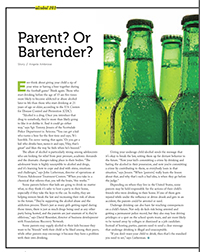 Ever think about giving your child a sip of your wine or having a beer together during the football game? Think again. Those who start drinking before the age of 15 are five times more likely to become addicted or abuse alcohol later in life than those who start drinking at 21 years of age or older, according to the U.S. Centers for Disease Control and Prevention (CDC).
Ever think about giving your child a sip of your wine or having a beer together during the football game? Think again. Those who start drinking before the age of 15 are five times more likely to become addicted or abuse alcohol later in life than those who start drinking at 21 years of age or older, according to the U.S. Centers for Disease Control and Prevention (CDC).
“Alcohol is a drug. Once you introduce that drug to somebody, they’re more than likely going to like it or dislike it. And it could go either way,” says Sgt. Tommy Jensen, of the Scottsdale, Ariz., Police Dept. “You can get a kid who tastes a beer for the first time and says, ‘It’s horrible – I’m never tasting that again,’ or you get a kid who drinks beer, tastes it and says, ‘Hey, that’s great!’ or likes the way he feels when he’s buzzed.”
The allure of alcohol is particularly strong among adolescents who are looking for relief from peer pressure, academic demands and the dramatic changes taking place in their bodies. “The adolescent brain is highly susceptible to alcohol and drugs, and it’s learning how to cope and deal with stress, emotions and challenges,” says John Lieberman, director of operations at Visions Adolescent Treatment Centers. “When you take in a chemical that relieves that, you tell the brain, this works.”
Some parents believe that kids are going to drink no matter what, so they think it’s safer to host a party in their home, especially if they take the keys to the car. In reality, they are helping minors break the law and increasing their risk of abuse in the future.
“They’re supporting the alcohol abuse and the addiction process, and there’s just as many girls getting raped during those times. There is just as much drugs being used as any other party being hosted, and the parents are just unaware of it; they’re oblivious,” says David Rosenker, director of business development with Foundations Recovery Network.
Some parents may supply alcohol to their kids because they want to be “friends” with their child or well-liked among their peers, while other parents may encourage it because they have a problem with their own drinking.
Giving your underage child alcohol sends the message that it’s okay to break the law, setting them up for deviant behavior in the future. “Now your kid’s committing a crime by drinking and having the alcohol in their possession, and now you’re committing a crime by contributing to them, so everybody loses in that situation,” says Jensen. “When (parents) really learn the lesson about that, and why that’s such a bad idea, is when they go before the judge.”
Depending on where they live in the U.S., some parents may be held responsible for the actions of their child’s friends who were drinking in their home. If one of them gets injured while under the influence or drives drunk and gets in an accident, the parents could be arrested or sued.
Under-age drinking can also have far-reaching consequences on a child’s future. Not only do kids risk being arrested and getting a permanent police record, but they also may lose driving privileges or a spot on the school sports team, and are more likely to be turned away by colleges or dismissed as a job candidate.
Instead of hosting parties, parents need to send a clear message that underage drinking is illegal and unacceptable. “If you don’t want your child to drink, then that’s the standard you need to set,” says Lieberman.